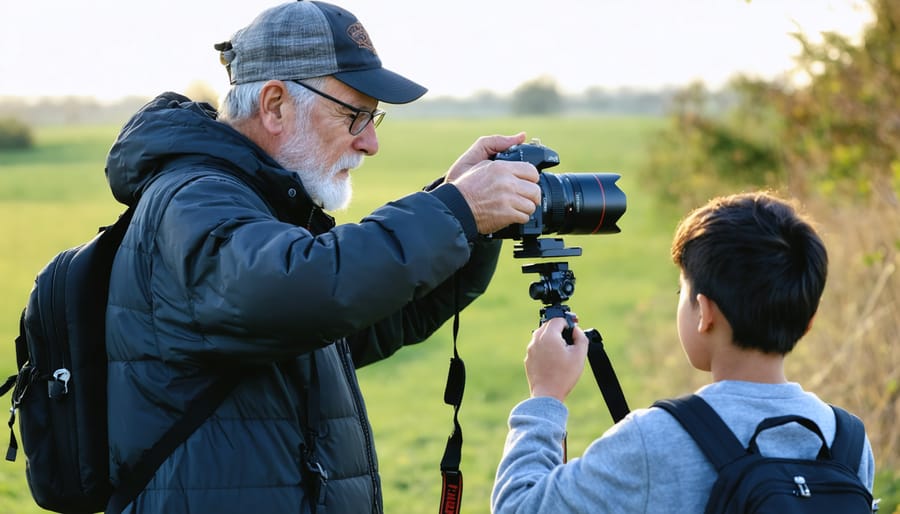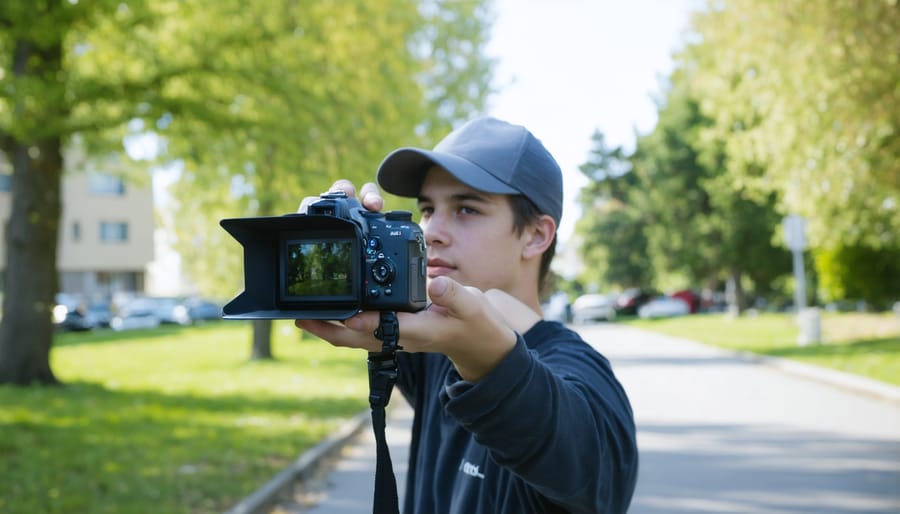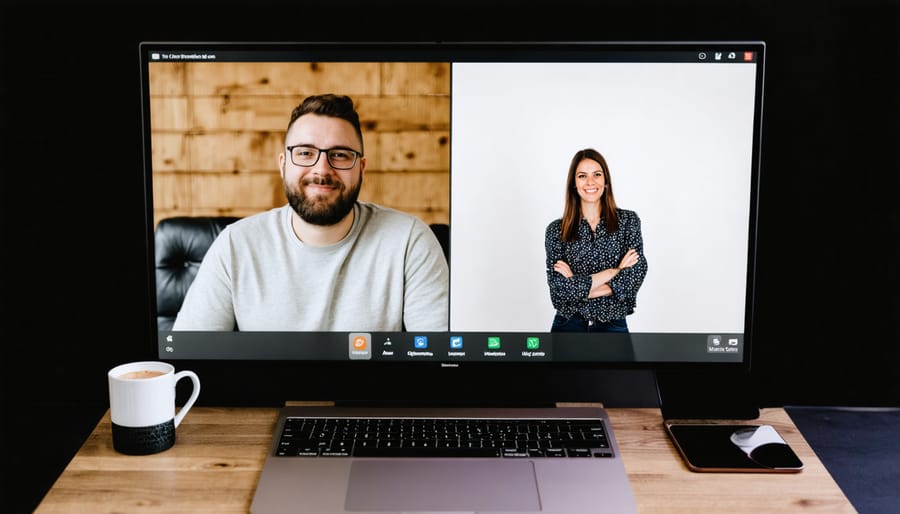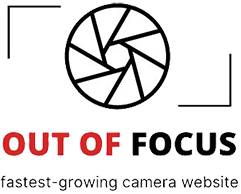
Transform your photography journey through dedicated mentorship – a proven path that turns casual shooting into incredible learning experiences. Master photographers have long understood that technical skills alone don’t create compelling images; it’s the nuanced guidance, real-time feedback, and personalized direction that accelerate artistic growth.
Think of mentorship as your fast-track through photography’s learning curve. While self-taught photographers often spend years discovering techniques through trial and error, mentored photographers leverage decades of accumulated wisdom to sidestep common pitfalls and develop their unique creative voice more rapidly. Whether you’re struggling with complex lighting scenarios, searching for your artistic style, or building a professional portfolio, a photography mentor provides targeted guidance that books and online tutorials simply cannot match.
The mentor-mentee relationship in photography goes beyond technical instruction – it’s about understanding the subtle interplay of vision, technique, and business acumen that defines successful photographers. This personalized guidance system has launched countless careers and transformed passionate hobbyists into confident professionals.
Why Photography Mentorship Matters
Beyond Technical Skills
While technical proficiency forms the foundation of photography, mentorship extends far beyond mastering camera settings and composition rules. A skilled mentor helps you develop your artistic vision by challenging your creative boundaries and encouraging personal expression through your work. They provide invaluable feedback on your unique style and help you find your authentic voice in an increasingly competitive field.
Moreover, mentors share crucial business insights that aren’t typically covered in photography courses. From pricing strategies and client communication to marketing techniques and portfolio development, these real-world lessons can significantly impact your success as a professional photographer. They can guide you through the complexities of building a sustainable photography business, helping you avoid common pitfalls and accelerate your growth.
The mentor-mentee relationship often evolves into a collaborative partnership, opening doors to networking opportunities and industry connections. This guidance helps you navigate the photography community, establish your brand, and create a sustainable career path that aligns with your artistic and professional goals.
Real-World Experience Transfer
Learning from someone’s real-world experience is like fast-tracking your photography journey through decades of trial and error. A mentor shares not just technical knowledge, but invaluable insights gained from countless photo shoots, client interactions, and creative challenges. They’ve already navigated the common pitfalls and discovered efficient workflows that might take years to figure out on your own.
When your mentor shares stories about managing difficult lighting conditions during a wedding ceremony or handling unexpected equipment failures during a commercial shoot, you’re gaining knowledge that no textbook or online tutorial can provide. These firsthand experiences help you develop problem-solving skills and professional instincts that are crucial in real-world scenarios.
Moreover, mentors can share industry-specific insights about business practices, client relationships, and networking opportunities that are often learned through years of experience. They can guide you through practical situations like pricing your services, creating contracts, or building a sustainable photography business. This experiential knowledge transfer helps you avoid common mistakes and make informed decisions as you develop your photography career.

Finding the Right Mentorship Program
Online vs. In-Person Mentorship
Both online and in-person mentorship offer unique advantages for photographers looking to enhance their skills. In-person mentorship provides immediate hands-on guidance, allowing mentors to demonstrate techniques directly and make real-time adjustments to your camera settings or composition. This traditional approach creates strong personal connections and enables mentors to spot subtle issues in your technique that might be missed through a screen.
Online mentorship, including virtual photography meetups, offers unprecedented flexibility and accessibility. You can connect with expert photographers worldwide, breaking down geographical barriers that might have previously limited your options. Digital platforms enable screen sharing for detailed post-processing tutorials, and recorded sessions can be reviewed multiple times for better retention.
The choice between online and in-person mentorship often depends on your learning style and schedule. In-person sessions excel at teaching practical skills like lighting setup and subject interaction, while online mentorship shines in areas like portfolio review and business strategy discussions. Many photographers find that combining both formats provides the most comprehensive learning experience.
Consider starting with online sessions to establish foundational knowledge, then supplement with occasional in-person workshops for hands-on practice. This hybrid approach maximizes the benefits of both formats while accommodating different budget levels and time commitments.

Evaluating Potential Mentors
When choosing a photography mentor, focus on finding someone whose work resonates with your artistic vision and career goals. Start by examining their portfolio to ensure their style and expertise align with the direction you want to take your photography. Look for mentors who have significant experience in your preferred photography niche, whether that’s landscape, portrait, or commercial work.
Consider their teaching approach and communication style. A great mentor should be able to explain complex concepts clearly and provide constructive feedback that helps you grow. Pay attention to how they interact during initial conversations – are they genuinely interested in your development, or do they seem more focused on selling their services?
Track record matters – look for testimonials from previous mentees and check their professional achievements. A mentor’s industry connections and real-world experience can be invaluable for your career development. However, remember that the most acclaimed photographer isn’t necessarily the best teacher.
Availability and accessibility are crucial factors. Ensure their mentoring schedule matches your learning needs and that they’re willing to provide the level of support you’re seeking. Some mentors offer structured programs, while others prefer a more flexible approach.
Finally, consider the investment required – both financial and time commitment. While quality mentorship often comes at a premium, the value should align with your budget and career objectives. Look for someone who offers a clear outline of what you’ll learn and achieve through their mentorship.
Making the Most of Your Mentorship
Setting Clear Goals
In any mentorship journey, setting clear, measurable goals is the cornerstone of success. Start by discussing your current skill level and aspirations with your mentor, being specific about what you want to achieve. Whether it’s mastering manual mode, developing a distinct style, or building a professional portfolio, your objectives should be SMART: Specific, Measurable, Achievable, Relevant, and Time-bound.
Create a photography roadmap with your mentor, breaking down larger goals into smaller, manageable milestones. For instance, if your goal is to excel in portrait photography, you might start with understanding lighting basics, then progress to posing techniques, and finally master advanced retouching skills.
Track your progress through regular portfolio reviews and feedback sessions. Many successful mentor-mentee pairs maintain a shared digital folder of images showing improvement over time. Consider keeping a photography journal to document challenges, breakthroughs, and lessons learned along the way.
Remember to regularly revisit and adjust your goals as you grow. What seemed challenging three months ago might now be routine, signaling it’s time to set new, more ambitious targets. This flexible approach ensures continuous growth while maintaining motivation and direction in your photography journey.
Communication Best Practices
Clear communication is the cornerstone of any successful mentorship relationship in photography. Start by establishing preferred communication channels and frequency – whether it’s weekly video calls, monthly in-person sessions, or regular email exchanges. Be upfront about your expectations and limitations, including time commitments and learning goals.
During sessions, practice active listening and take notes. Don’t hesitate to ask for clarification when concepts aren’t clear, as this helps both parties understand where additional explanation might be needed. Remember that good mentors appreciate specific questions rather than vague requests for help.
Share your progress regularly through your portfolio or recent work, allowing your mentor to track your development and adjust their guidance accordingly. Be open to constructive criticism – it’s a vital part of growth in photography. When receiving feedback, try to understand the reasoning behind suggestions rather than just the technical adjustments.
Respect boundaries and agreed-upon meeting times, and always come prepared with questions or work to review. If you need to reschedule, provide adequate notice. Remember that mentorship is a two-way relationship – show appreciation for your mentor’s time and expertise by implementing their advice and sharing your successes with them.

Building Long-term Professional Relationships
Building meaningful professional relationships is one of the most valuable long-term benefits of photography mentorship. When you work closely with a mentor, you’re not just gaining technical knowledge – you’re becoming part of their professional network. This connection often opens doors to opportunities that might otherwise remain closed.
Many successful photographers credit their early mentorship experiences for helping them connect with other photographers and industry professionals. These relationships frequently evolve into collaborations, referrals, and even business partnerships. Your mentor’s network becomes an extension of your own, providing access to potential clients, gallery owners, and fellow creatives.
The beauty of mentorship-based relationships lies in their organic growth. Unlike quick networking events or social media connections, these bonds are built on shared experiences, mutual respect, and genuine learning. Your mentor becomes invested in your success, often becoming a long-term advocate for your work.
Consider Sarah, a landscape photographer who started with a mentor five years ago. Today, she not only maintains a close professional relationship with her former mentor but has also become part of a thriving community of photographers who share clients, equipment, and opportunities. Her mentor’s introduction to gallery owners led to her first solo exhibition, and now she’s mentoring emerging photographers herself.
Remember, maintaining these relationships requires effort and professionalism. Stay in touch regularly, share your progress, and look for ways to give back to your mentor’s community. The connections you forge through mentorship can become the foundation of a successful photography career that spans decades.
Photography mentorship represents a transformative journey that can significantly accelerate your growth as a photographer. Whether you’re just starting or looking to refine your professional skills, the guidance of an experienced mentor can provide invaluable insights, constructive feedback, and industry connections that would take years to develop on your own.
Remember that successful mentorship is a two-way relationship built on trust, commitment, and open communication. As you consider taking this step, focus on finding a mentor whose style and expertise align with your goals, but also someone who understands your vision and challenges.
Don’t be afraid to reach out to photographers you admire or join photography communities that facilitate mentorship connections. The investment in mentorship – whether through formal programs or informal relationships – can yield returns that extend far beyond technical skills, helping you develop your unique creative voice and professional identity.
Take action today by researching mentorship opportunities in your area or online. Your future in photography might just be transformed by the wisdom and guidance of someone who’s walked the path before you.























